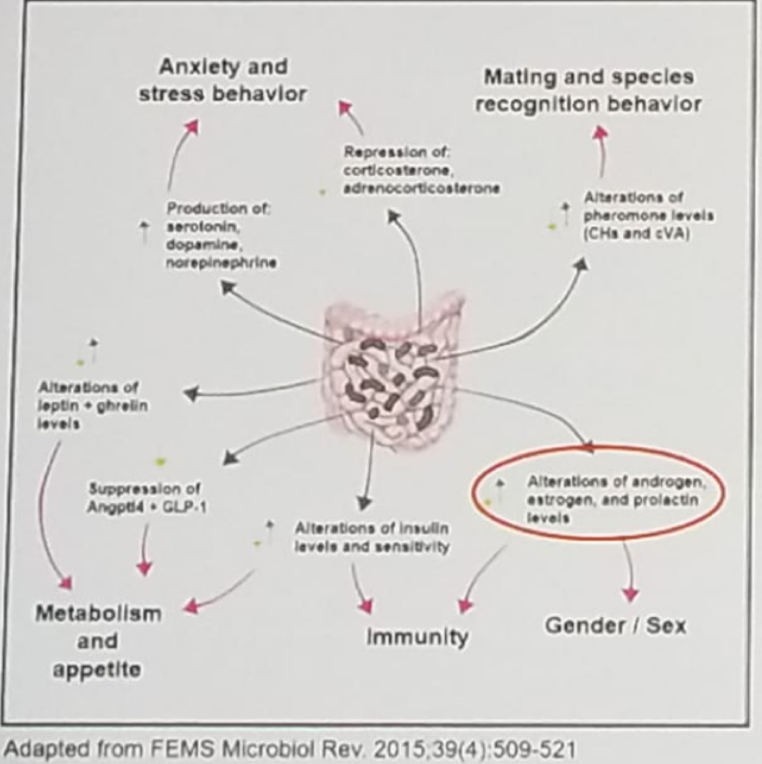- Production of beneficial metabolites and vitamins
- Break down certain dietary components
- Shape the immune system
- Ward off pathogens
- Assist with maintaining epithelial barriers
The microbiota has a correlation to genitourinary cancer which can either be direct or indirect. Direct interactions include infections, inflammation, the presence of urinary microbiome, and urinary microbiota metabolites. Indirect interactions include xenobiotic metabolism (dietary carcinogens, drug metabolism), cancer therapy/treatment response, systemic inflammation/cytokines, and treatment related toxicities. The gut microbiome modulates treatment response to chemotherapy and immunotherapy.
One of the proposed mechanism that link gut microbiota to cancer is through androgen modulation. Specific changes in hormone levels correlate with the presence of gut microbiota. The microbiota produces and secrets hormones, responds to host hormones and regulates expression levels of host hormones (figure 1).
A published study had hypothesized that oral androgen receptor axis-targeted therapies (ATT), including bicalutamide, enzalutamide, and abiraterone acetate, may be associated with differences in the GI microbiota (1). In this study fecal microbiota of 30 patients that included healthy male volunteers and men with different clinical states of prostate cancer were profiled using 16S rDNA amplicon sequencing. The results showed measurable differences in the GI microbiota of men receiving oral ATT. The authors concluded that oral hormonal therapies for prostate cancer may alter the GI microbiota, influence clinical responses to ATT, and/or potentially modulate the antitumor effects of future therapies including immunotherapy. Select differentially abundant species or families of GI microbiota exist in men with or without hormonal therapy.

Figure 1: The various effects of microbiotome:
In summary, the composition of GI microbiota may have a significant influence on the efficacy of cancer treatments and vice versa. There are measurable differences in the GI microbiota of men receiving oral ATT. Oral hormonal therapies for prostate cancer may alter the GI microbiota, influence clinical response to ATT and /or potentially modulate he anti-tumor effects of future therapies including immunotherapy. Future studies will require longitudinal sampling and measure of microbial hormone metabolites.
Presented by: Karen Sfanos, MS, PhD, Associate Professor of Pathology at the Johns Hopkins University School of Medicine
References:
1. Sfanos KS et al. Prostate Cancer and Prostatic Diseases (2018)
Written By: Hanan Goldberg, MD, Urologic Oncology Fellow (SUO), University of Toronto, Princess Margaret Cancer Centre, @GoldbergHanan, at the 19th Annual Meeting of the Society of Urologic Oncology (SUO), November 28-30, 2018 –Phoenix, Arizona